JULY 2025 ISSUE 16
TRUMP'S ‘BIG BEAUTIFUL BILL’ INVERTS BIBLICAL VALUES
HOW TO RECOGNIZE THE REMNANT WATCHING SINNERS A SUPPLEMENT OF ABSURDITIES
STAY SAFE AT A PROTEST






JULY 2025 ISSUE 16
TRUMP'S ‘BIG BEAUTIFUL BILL’ INVERTS BIBLICAL VALUES
HOW TO RECOGNIZE THE REMNANT WATCHING SINNERS A SUPPLEMENT OF ABSURDITIES
STAY SAFE AT A PROTEST





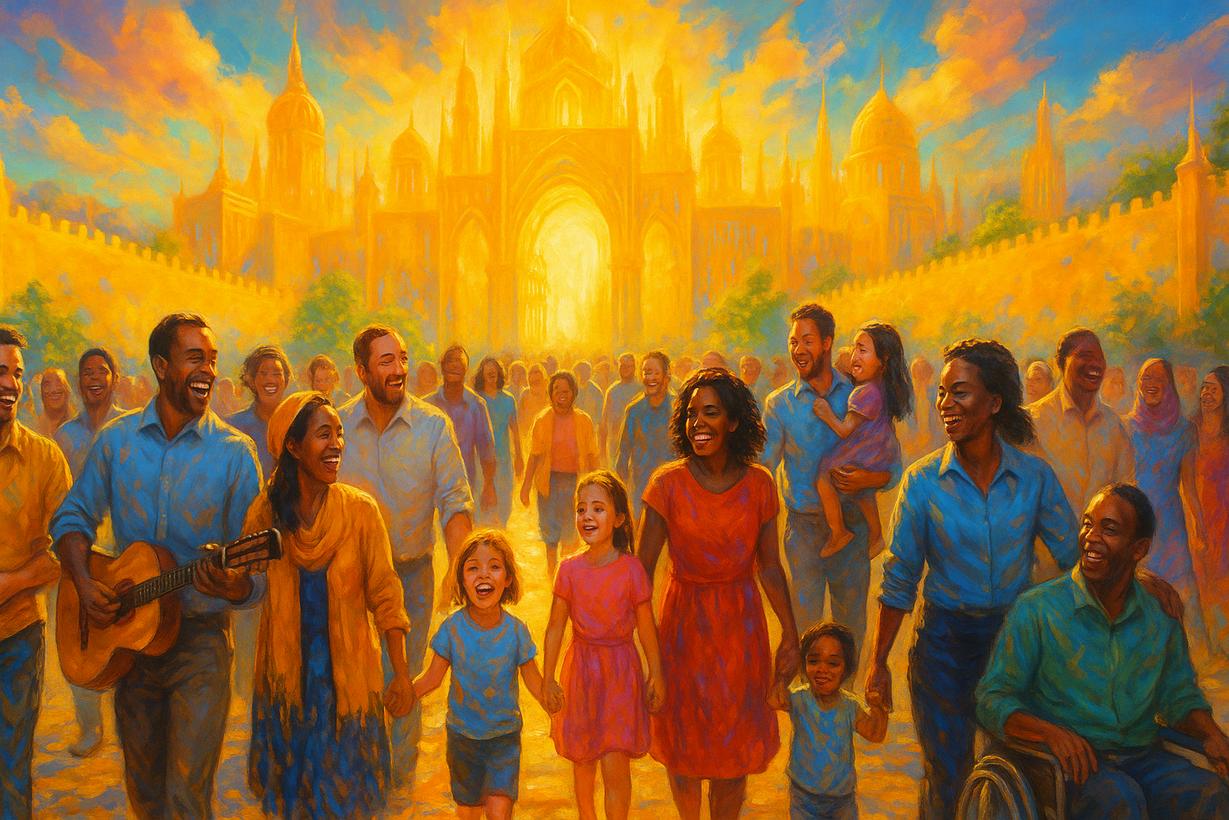

An old joke tells of Saint Peter warning people as they walk the streets of gold in the New Jerusalem to be very quiet when passing the enclave where Seventh-day Adventists are spending eternity The punchline: “They think they’re the only ones here ”[i]
It’s normal (even inevitable) for us to believe that we’re somehow special based on our income, race, political affiliation, or religious persuasion. How often do our chests swell with pride when someone mentions Barry Black, chaplain of the United States Senate, if, for no other reason, that he’s a Seventh-day Adventist?
[ii]
In a few weeks the institutional Seventh-day Adventist Church will have its quinquennial General Conference session in St Louis, Missouri There Adventist administrators, clergy, and lay members will gather to conduct church business, but more importantly to celebrate what it means to be God’s chosen people His remnant.
Delegates from all over the world will hear songs, sermons, and presentations designed to reinforce the notion that the only thing preventing Christ’s return is (choose one): a) that his people aren’t sufficiently prepared (they haven’t yet perfected their characters), b) that the world hasn’t been sufficiently warned about the virtues of observing the seventh-day
Sabbath, or c) that Satan hasn’t yet succeeded in “deceiving the very elect ” For about 10 days Adventists in St. Louis, and many more watching online, will sing, pray, and preach about Jesus coming “very soon ”
The sad thing about all this inward thinking is that by focusing on ourselves we become blind to the very real needs of those who live in our neighborhoods and communities; those who don’t care about women’s ordination, about fundamental beliefs, or even who the next General Conference president will be Their concerns are much more fundamental: how “to act justly and to love mercy and to walk humbly with your God” (Micah 6:8)
“They think they’re the only ones here.”
During His public ministry Jesus appropriated these words from the prophet Isaiah as His mission statement: “To proclaim good news to the poor to proclaim freedom for the prisoners and recovery of sight for the blind, to set the oppressed free, to proclaim the year of the Lord’s favor” (Luke 4:18, 19) If past experience is any indication, the General Conference in St Louis will emphasize less the importance of social activism and more blatantly trumpet the
triumphalism about how Adventists are the only ones God has truly chosen Is it any wonder that a movement commissioned to communicate a message to “every nation, tribe, language, and people” (Rev 14:6) is barely known in wider society. Could it be that it is stuck congratulating itself as God’s remnant when it should be carrying out Christ’s mission to those who are poor, imprisoned, oppressed, and marginalized. Plus, being so inward-focused prevents us from noticing the efforts of people and groups who are not Seventh-day Adventists yet have much more of an impact on their communities than we do.
Although the book of Revelation pictures a symbolic number counted as those who follow the Lamb wherever he goes 144,000 elsewhere in the book John saw “a great multitude that no one could count from every nation, tribe, people, and language” (Rev. 7:9). That’s why we won’t have to be quiet as we walk the streets of the New Jerusalem
Stephen Chavez
The joke works as well with any group that thinks they alone have earned God’s unmerited favor







The first General Conference Session in 1863 drew 20 delegates When the 62nd session convenes in St. Louis, Missouri, beginning July 3, 2025, the roll will surpass 2,800, with as many as 100,000 visitors on weekends From a time and resources standpoint, effectiveness and efficiency are paramount.
According to the General Conference (GC) working policy, this meeting represents the “highest authority in the Seventh-day Adventist Church under God ” Accordingly, the session has unique responsibilities found nowhere else in denominational structure: [i]
election of General Conference and North American Division leadership[ii] approval of the Statement of Fundamental Beliefs amendments to the General Conference Constitution and Bylaws amendments to the Church Manual admission/dismissal of member entities in the General Conference other items that may have been referred for Session action
Session business is accompanied by daily devotional meetings, video reports from the 13 divisions, plus program promotions and reports
It makes for a very intense 10 days
A successful GC Session owes a lot to people behind the scenes: notably, the Session Management Committee. An international gathering of this magnitude requires adequacy of location, facilities, hotel accommodation, and meals, which is why this group begins to work up to 10 years in advance.
The delegate total for the year 2000 (1,844 in attendance) was reduced from the delegate total in 1995 (2,321 in attendance), but since that time, delegate counts have grown again. It may seem logical to expect that a growing world membership requires a growing delegation. I believe, though, that a reduction in numbers of delegates need not be a detriment to good decision-making Few other religious organizations conduct their denominational business with such a large delegate count over the course of 10 days
An experiment to reduce the number of days of a GC Session to six for the session held in 2022 was deemed unsatisfactory, since it required business sessions to extend into evening hours. Shortening a session’s duration, without giving careful thought to the work that
needs to be accomplished, cannot prove beneficial
At the top of the agenda is election of leaders for the General Conference and its divisions The GC Session begins with selection of a nominating committee, which over the course of three or four days will bring recommendations for more than 100 leadership positions leaving its members no time to participate in other business.
The nominating committee is under serious time pressure. It has little time for extended research or evaluation of candidates, because a nomination for president is expected within a matter of hours An unintended consequence is that incumbents, because of their familiarity, generally have an advantage
Other denominational entities have addressed these challenges by having the nominating committee meet in advance of a constituency session, which allows for a more deliberative selection process and gives the nominated president more time to compose a leadership team.
Since a globally represented nominating committee meeting in advance of a General Conference Session could be easily arranged, thanks to modern technology, surely there is merit in considering alternatives to the present system.

The church is organized for mission.
Following his election, the General Conference president meets with the nominating committee as an advisor. The committee receives, but is not obligated to endorse, his recommendations for the leadership team. If the president is new to the role, he must very quickly prepare a roster of recommendations Some have suggested that the nominating committee might sense fewer constraints if the GC president were to present his recommendations and rationale, then leave the room.


It goes without saying that GC Session delegates, who receive agenda information well in advance, should familiarize themselves with it The question we face is how to conduct business session discussion productively and efficiently Open discussion is an important mocracy in practice, and we must pportunity to challenge and to suggest alternatives all of bute to respect and trust in the tself. It is in discussion, however, an get bogged down.


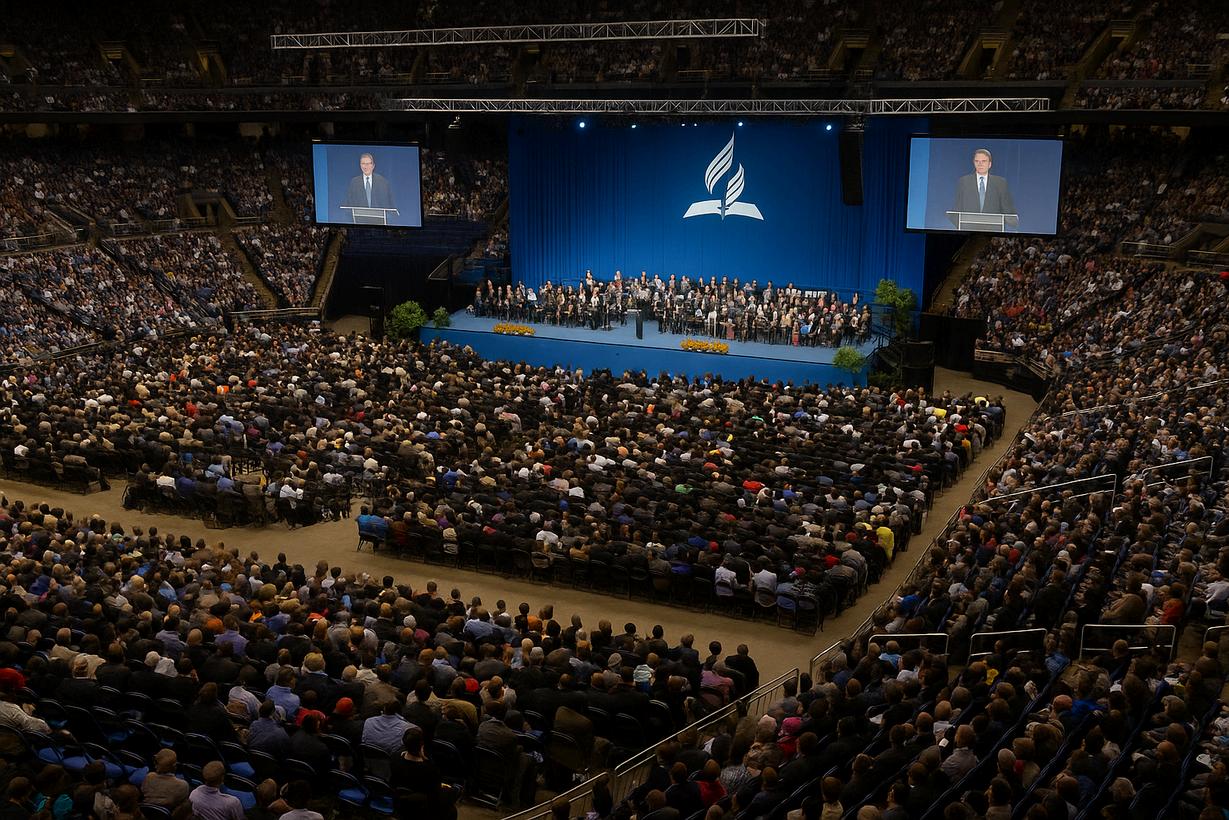


Amendments to Fundamental Beliefs go through a years-long process that involves extensive communication, inviting contributions from around the world Usually, after such an extensive process, recommendations are readily adopted.
The picture is different, however, with the Constitution and Bylaws and the Church Manual Any proposals for amendment to these documents have been considered in advance by the General Conference Executive Committee and communicated to division executive committees. Yet, the delegates get to discuss these only at the GC Session. This creates a queue of people asking for clarification, expressing dissent, or offering alternatives. Sometimes extended floor discussion prompts motions to close debate, which wouldn’t be necessary if delegates had an opportunity to address questions directly with the committee concerned.
Members of the standing Constitution and Bylaws Committee, as well as the standing Church Manual Committee, have been available during each GC Session to address matters that may be referred to them during discussion It would be more efficient, though if these committees met on the first o the session and encouraged d concerns or que questions with t time needed for
For better or Executive Com brought to the (80%-95%) ma
A significant portion of time at a GC Session is devoted to amendments to the Church Manual
For almost 70 years following formal organization, the General Conference was reluctant to codify the operation of each local church Over the course of time, however, there was growing recognition that local congregations would appreciate some guidance The first edition of the Church Manual
was published in 1932, with an introduction stating that “it has become increasingly evident that a manual on church government is needed to set forth and preserve our denominational practices and polity ”[iii]
The 1946 General Conference Session voted that “all changes or revisions of policy that are to be made in the Manual shall be authorized by the General Conference Session ”[iv]
Session business is accompanied by daily devotional meetings, video reports from the 13 divisions, plus program promotions and reports.


One of the challenges with such a document is the tendency for it to become, over time, more prescriptive than descriptive of local church life The vast diversity of congregations in terms of size, language, cultural context, and organizational experience makes it difficult to create a single pattern for how to operate Elements of Church Manual authority are vigorously adhered to in some congregations, while somewhat ignored or adapted in others. For global use, the Church Manual needs to be descriptive rather than prescriptive. Its role in the world church might be significantly enhanced if it were to enunciate the essential principles of local church structure and operations and provide application examples, then leave it at that.







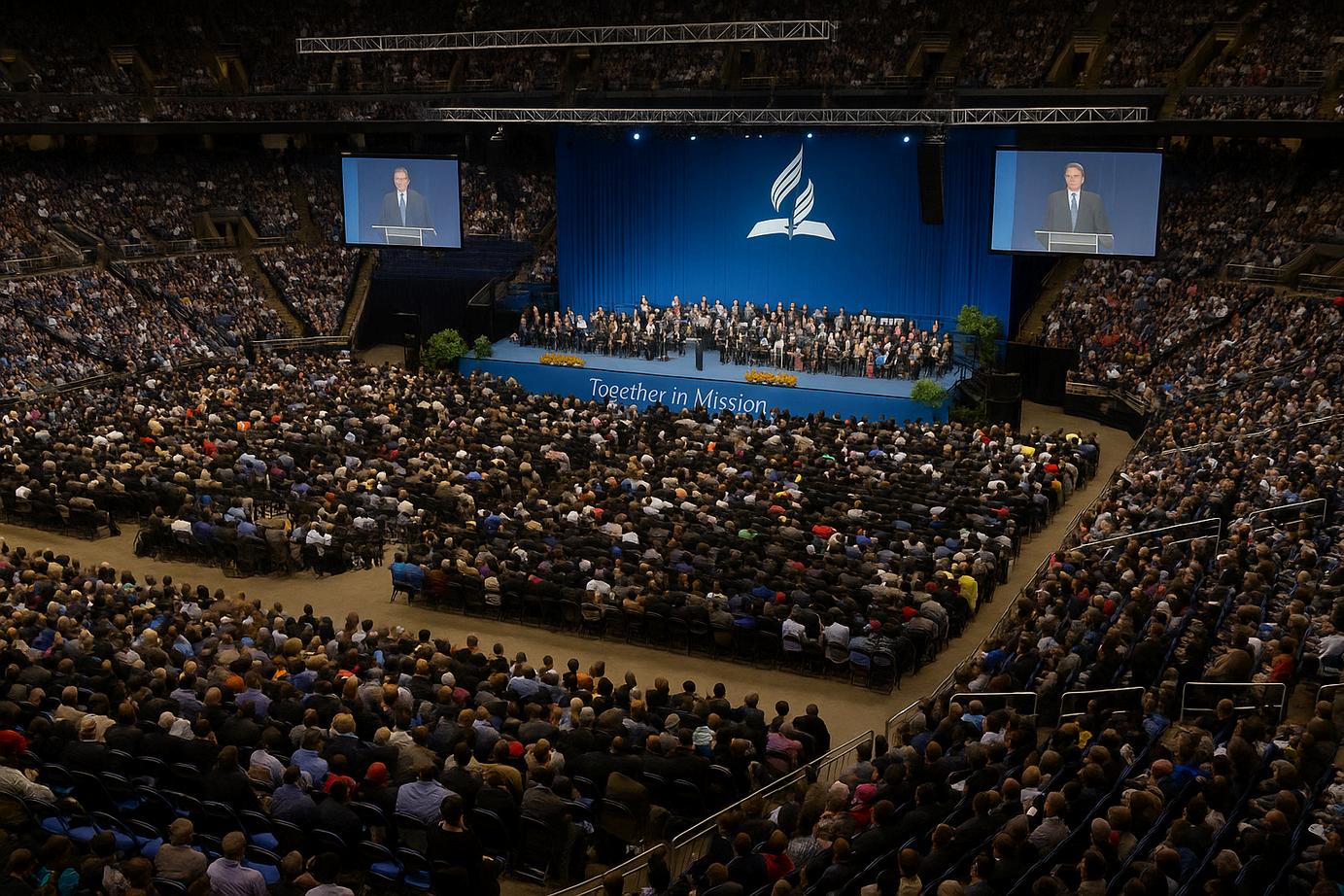

I had agreed to meet my wife, a member of the GC Session Music Committee, at the main exit following the Sabbath worship service near the conclusion of the 2005 General Conference Session in St Louis The international crowd was streaming from exits. Not far from where I stood were two persons from Africa, attired in stunning national costumes A delegate, obviously from India, also noticed the African Adventists and immediately desired to have his picture taken with them (This was before “selfies” became common ) Motioning wordlessly to a person nearby (obviously from East Asia), he offered his camera and by gesture requested that a picture be taken of himself with the two Africans. Once the camera was returned to its owner, smiles acknowledged mutual acceptance of the momentary incident
What fascinated me was that no words were expressed. This had all happened silently perhaps in expectation that while different languages were a barrier to communication, gestures would suffice. Just when the group of four was about to disperse, the Indian man looked directly to the other three and, with index finger spearing the air, exclaimed, “One God, one church!”
The whole scene transpired in hardly more than a minute I had been heavily involved in the business sessions and felt eager for it all to be over But here, in these brief seconds, I got caught up in a reality that surpassed a focus on church business. People who had never met before experienced a collective identity that overwhelmed distinctives such as race, culture, gender, nationality, age, and political convictions. They had bonded on the platform of shared faith in the one God of the universe
After reflecting on this picture moment from 20 years ago, I am not sure we can devise any better way to create a shared identity, despite all of the pressures and influences that arouse thoughts of otherness in human communities.
A General Conference Session is remarkable. It requires years of planning and considerable
expense in finance and in time It provides for global membership engagement through the selection of representatives. Delegates who attend are generally favorably impressed with what they see and learn about the global church. Upon departure from a session, delegates know by experience that the church is held together by values more than by votes
This value cluster includes:
our submission to Jesus, the Bible, and the Holy Spirit
a collective commitment to partnership in worldwide mission n respect for the church as the body of Christ, despite its imperfections
a willingness to keep striving for togetherness while respecting differences the merit, amid struggles, of group decision-making processes throughout the global structure
Perhaps the most significant underlying message that comes from attendance at a GC Session is that the church is organized for mission God does not have a mission for the church so much as he has a church for his mission May we be that church!
Lowell C Cooper worked at the world church headquarters from 1994 to 2015 He served as a General Conference associate secretary for four years, then as a general vice president for more than 16 years. He is now retired, living in Washington state This article originally appeared in the spring, 2025 issue of Adventist Today
[i]
General Conference Working Policy (2023-2024), B 10 22
See General Conference Bylaws, Article VI, Section 1 and Article XIII, Section 1 c
[ii] Seventh-day Adventist Church Manual, 20th edition (revised 2022), p 17
[iv]
[iii] Op cit p 17
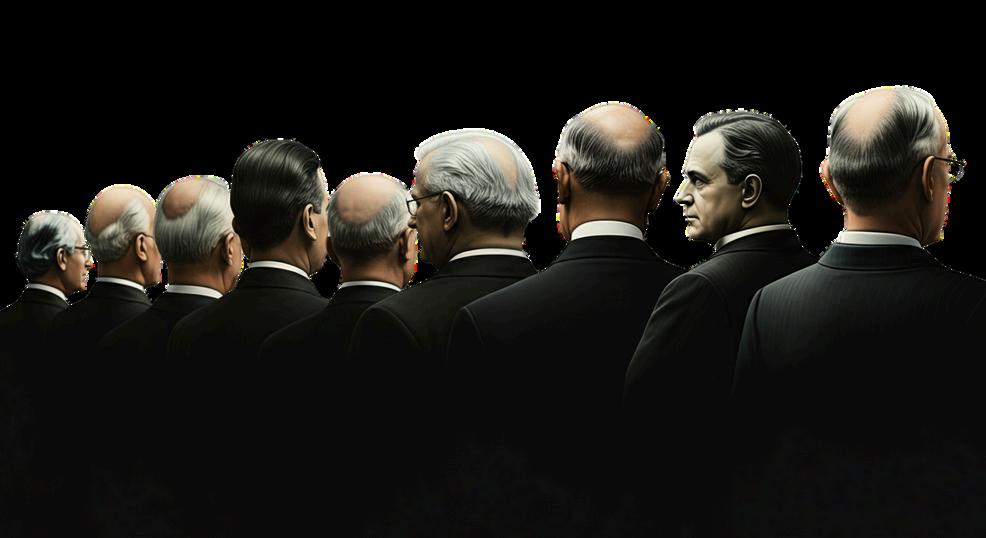

In its 122-year history, 17 men (yes, all men) have served as president of the General Conference of Seventh-day Adventists. Take this quiz to find out how well you know your Adventist trivia.
A. Oldest to become General Conference president
B. Youngest to become General Conference president
C. Served as president the most times
D. Served as president the longest
E. Served the shortest time as president
F. Those born outside the 50 United States

1. John N Andrews
2. George I. Butler
3. John Byington
4. Arthur G. Daniels
5. Robert S Folkenberg
6. Ole A. Olsen
7. Jan Paulsen
8. Charles W. Watson
9. James White
ANSWERS:
SCORE:
If you got six out of six, go to the head of the line No further sanctification is necessary
If you knew all nine names (without checking Wikipedia), make sure your crown is large enough to contain all your stars
If you got three out of six, you can still claim the title “remnant.”
If you came up empty, get in line with the apostle Paul, who called himself “chief of sinners.”
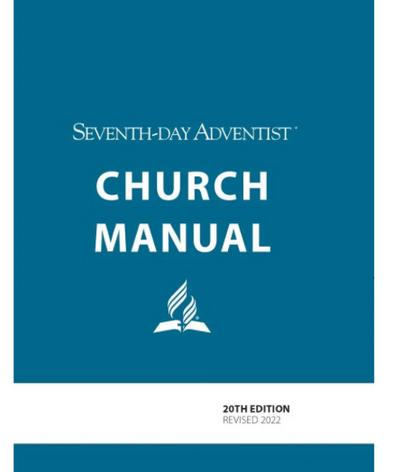


Longtime Zimbabwean political leader Eddison Zvobgo once said: “When there is a relay race, the expectation is that one runner hands over the baton to the next runner until the race is finished However, the problem comes when the baton is given to the madman of Ngomahuru [Zimbabwe’s well-known mental hospital] who, instead of handing it over to the next man in the race, continues running all the way into the forests and mountains.”
The latest General Conference (GC) Annual Council, held October 10-16, 2024, was the immediate precursor to the 62nd GC Session, which will convene in St. Louis in July. The Annual Council agenda included robust discussions and decisions on reports, including church membership, finances, the performance of critical departments and church institutions, celebrations of success in the mission, and proposed changes to the Seventh-day Adventist Church Manual. Each of these items must be presented to delegates in St Louis, and many will likely be approved
With the denomination’s increasing institutionalization, the Church Manual has come to play a pivotal role in equipping local leaders to coordinate and manage congregational affairs This has made proposed revisions to the Church Manual a standing feature in GC Sessions and Annual Council meetings Twenty-two revisions
will be proposed this time.
Of particular interest is the addition of four supplementary sections specifically for North America, South Pacific, InterAmerica, and South America These additions, unique to each region, cover asset and property management, wills and legacies, communion, theology, marriage and weddings, liturgy, ordination of women as elders, theological pillars, Sabbath observance, use of digital technology, ethnic and political tensions, gambling, poverty, and more.
Silence is not an option. Renewal is necessary.
The Ted Wilson administration has prioritized homogeneity and administrative centralization, but global Adventism is extraordinarily diverse, and it is becoming clearer that one size does not fit all. Back in 2010 and 2015, when the debate about women’s ordination was raging, church leaders resisted a contextualized rule that would allow North American and European judicatories to ordain women.
Do these regional Church Manual additions show that leaders now see the futility of trying to keep the whole world church on the same page? Perhaps we are entering an era in which
leadership, in trying to navigate the complexities of the 21st century, is acceding to the pressures of contextual adaptation. The needs of each region are unique, and this must be respected Adventism has multiple faces and diverse expressions yet our church leaders have always resisted admitting this.
The irony here is that Adventist leaders appear to be decentralizing and contextualizing not to facilitate the work in local fields, but to entrench their own power They seem to be saying that the rules in the Church Manual are not strict enough in some regions, so they must be tightened them to maintain General Conference control over local fields
If Adventism is serious about mission, it must deliberately keep decentralization fundamental, embrace diversity, and abandon its addiction to homogeneity The idea is not to have more rules to exercise control, but more provisions to facilitate flexibility, adaptation, and creativity
The Inter-American Division, in its proposed Church Manual addendum, included a recipe and baking instructions for communion bread. It specifies that “the following recipe has been VOTED to be used for the Lord’s Supper ” If that sentence is voted in St. Louis, the Church Manual would seem to say that it would be against Adventist beliefs to use any other recipe! For a recipe to get a place in the Church Manual is unprecedented. At this rate, it would not be surprising to have a clause inserted on the temperature of water used for baptism
Where do these contextualized rules end, and what parameters exist to define what makes it into the Church Manual? We are becoming a church obsessed with regulations and requiring what God has not required There’s an inherent fear that Adventism is under attack and that enacting more rules will give us a semblance of control and commitment
It is well known that we are, on average, losing four out of every 10 members. (This number would likely be worse if all congregations did membership audits.) Conventional wisdom is that
our rate of attrition is not due to doctrine or theological issues but, rather, due to church conflict, a lack of community, or even to abusive treatment
Could it be that our becoming more ritualistic, legalistic, and mechanical is symptomatic of a failure to cultivate intimacy with God? Sometimes it seems we are obsessed with creating laws of such particularity that it is actually harder to be a Christian. The tendency to multiply outward forms, and to develop hypersensitive religious scruples, exposes a lack of depth in our walk with God. . . .
Among the changes to the Inter-American Division section is a proposal concerning the ordination of women as church elders The way this section is set up, women serving as elders at a local church are treated as an exception an anomaly that is potentially divisive and requires approval of the conference committee after consultations with the union leadership.
The proposal paints this process as a negotiated outcome, with each case requiring clear consensus on the need for the ministry of a woman elder and its contribution to the spiritual well-being of the local church family. The local church must prove that there are dimensions of spiritual service and counsel that a male elder cannot adequately fulfill! Election of a female would require most local churches to take the action to a specially called church business meeting, in which every church member is present.
This proposal deserves outright rejection Despite the 1984 decision that women can be ordained as elders, we are still trying 40 years later to protect God from the women created in God’s image The volunteer service of women elders is portrayed as a threat, and they will be required to go through many hoops to exercise their God-given gifts in the church Instead of dismantling processes and attitudes that discriminate against women, we have a regional division proposing to make it almost impossible for them to serve as ministry leaders, even in a volunteer capacity.
Rather than challenging unbiblical views on ordination, we are using Church Manual provisions to entrench misogyny
Are we serious about mission? The General Conference successfully dissuaded the world church from ordaining women as pastors, and now, in the Inter-American Division, it is doing the same for their serving as elders. A church in which, I remind you, the most well-known of our pioneers was a woman and women have long constituted most of the membership what is our fear?
The Seventh-day Adventist Church continues to run on a structure inherited in 1901 characterized by duplicated offices and roles at local church, conference, union conference, division, and GC levels.
Sections of the proposed supplements suggest that the conference and union conference would increasingly serve as gatekeepers to ensure local church compliance with the mandates of church administrators In this process, we are treating congregations as franchises, locally detached but globally aligned, existing to demonstrate compliance more than mission The proposed revisions, when analyzed holistically and added to existing rules, would only stifle local churches
All of this puts a massive burden on the GC Session. In addition to the voluminous Church Manual revisions that already consume three days, the addition of division-specific supplements will require delegates to endure the torture of voting further revisions (and edits on revisions) Future sessions will be collective editing sessions of trivial rules Is this the best use of time and resources for these expensive meetings? . . .
Most all Adventists by now are aware that each GC Session involves more church employees than lay members. This could explain the penchant for instituting more rules, since they make administrative structures stronger and more necessary. In recent years, the General Conference has multiplied rules that extend its tentacles into the local congregation, reducing union conferences and local conferences to
mereenforcers Themore Church Manual provisionsareadded,themoreenforcementis required.
Thetimehascomeforlocalchurchesandlay memberstopushback Wecan:
Push back attempts to entrench kingly power perpetuated through centralization and excessive homogeneity.
Push back processes and attitudes that discriminate against women and keep them from effectively serving the church
Push back institutionalized inefficiencies that are camouflaged as calls to mission and stewardship.
Push back against governance meetings whose agenda is carefully curated to divert attention from holding those in leadership accountable
Push back business meetings and sessions that give more power to denominational workers than to church members
Push back Church Manual supplements that contain more absurdities than answers to facilitate the mission
Adventism has entered a cul-de-sac But instead of stopping to identify the way out, we are circling around in it. The road to St Louis is open, but business cannot be as usual Those privileged to be delegates need to ask difficult questions, demand uncomfortable answers, and prayerfully help redirect the church out of the cul-de-sac
Silence is not an option. Renewal is necessary. It is time to snatch back the baton from the madman of Ngomahuru and carry it through to the finish line
Admiral Ncube is from Zimbabwe A development analyst based in Botswana, he is a father of three and husband to Margret This article is abridged from the spring 2025 issue of Adventist Today
If they don’t give you a seat at the table, bring a folding chair.

Shirley Chisholm
We are only the light bulb, and our job is just to remain screwed in Desmond Tutu
One week of building houses for poor families is worth five years of Bible studies on the importance of Christian service We have taken with us scores of teenagers who did not believe in Jesus’ admonition to serve, but came to believe it by doing it
Kate Murphy TRANSFORMATIVE
I think some of us inside the church have forgotten how transformative and lifechanging and how inherently and intrinsically good the gospel is.
I do not want the peace that passeth understanding. I want the understanding which bringeth peace.
Helen Keller INSIGHT
Believe in the Lord Jesus, and you will be saved, you and your household. Acts 16:31 THEN FOLLOW HIM
Bill McNabb
The purpose of life is not to be happy, but to matter to be productive, to be useful, to have it make some difference that you have lived at all.
Leo Rosten
Nothing could more surely convince me of God’s unending mercy than the continued existence on earth of the church.
Annie Dillard
--Compiled by Chris Blake

Church basement coffee in one hand and my daughter’s seven-year-old paw in the other, I wandered over to the Beginner 1 Sabbath School classroom looking for Michelle. I needed to hug her after a particularly horrific week But as expected, she wasn’t there I knew her week was worse than mine. Instead, I found my college chaplain, Rich and his wife Kenna Lee, who had also served as my “Work Mom” for many years while we all served at Union College (now Union Adventist University). How dare they retire. We still had a few minutes before I was due in Beginner 2 Sabbath School for Ring-a-Ling-aLing time and for some reason, I asked Rich and Kenna Lee, “How is your spiritual battery?”
“Fine” says Rich “How’s yours?”
Waterworks. I wasn’t expecting to melt down, especially in the presence of almost-walking toddlers in their Sabbath best My daughter looked at me worried and gave me the three quick hand squeezes that mean “I love you.”
“I have never felt so spiritually empty in my entire life ” I admitted Long story short, I’m frustrated with the way our religious organizations treat the marginalized AND I am in need of a vacation and several hugs I’m burned out. I think we have all been there. These moments are what Church is for, right?
Church is our gathering place, where we go to refill our spiritual batteries It’s a healing center


for the spiritually sick (ooh, that’s me!) and where our salivary glands are trained to weep for casseroles when we hear pipe organ music
The General Conference is NOT church
But what is this General Conference, and does it matter?
Full disclosure Never have I ever gone to a General Conference session. It’s never been a big dream for me; huge earthly crowds do not spark joy
Sidenote: If you are going to the General Conference, I hope you will find Chris Blake and grab an autographed copy of his latest book, Imagine Life, which I had the privilege of reviewing last month. Flip to the “Imagine Church” section and read the chapter titled “All Religion Is Local.” Maybe Chris will be a dear and stick a little bookmark right there for his GC customers (hint hint).
The 94-page agenda of this year’s GC session tells us that the General Conference is responsible for amending the Church Manual. Proposed amendments to the manual are voted by General Conference delegates every five years. It defines the territories of union conferences and conferences; a giant organizational chart This year’s agenda also proposes several wording changes, including:
Adventist Review Ministries will be renamed to Adventist Review Oooh
The discipleship has sailed. Now we say disciple-making Aaah
Instead of Campus Ministries, we say Campus Ministry. Wheee!
The General Conference is an administrative body, and the church manual that it produces provides broad definitions and guidelines that are explained with Bible verses and Ellen White quotes The General Conference will do and say things that we like, they will do and say things that we loathe, and they will do and say things that make us wonder why they took the time to do so It doesn’t define us individually
But what is God like?
God isn’t the church. God isn’t the General Conference, or any delegates thereof


The last book ever written by the late Rachel Held Evans, What Is God Like? is a beautiful balm for sore spiritual muscles. Written for children and applicable to everyone, Evans states that while God is far too big for any of us to fully see, God is like an eagle, a river, the stars, like a shepherd, the flame of a candle and also like the wind God is like an artist and a mother and a father, like three dancers in harmony God is like a rainbow full of color, like a best friend, because God is safety, bravery, and love This is the book to read when you’re tired of church politics and are craving God.
Amidst my ongoing spiritual battery drainage, glimpses of God like this have kept me going along with my church basement coffee and Ringa-Ling-a-Linging friends. Stay strong, Pulse readers









Ryan Coogler’s latest film, Sinners (2025), has grabbed culture by the collar, earning a quarter billion dollars in its first three weeks and igniting passionate discourse across social media. This R-rated horror film is breaking records in its category and genre with good reason
Set in Clarksdale, Mississippi, Sinners follows twin brothers called Smoke and Stack both played by Michael B Jordan who return to Mississippi from Chicago to open a juke joint. They dream of creating a sanctuary for Black joy, music, and community, as well as a profit to fuel its ongoing success But on opening night, as blues music fills the air a group of vampires led by Remick (Jack O’Connell) descends What unfolds is terrifying, violent, and profoundly emblematic. This is not just a horror movie. It is a haunting exploration of America’s deepest wounds
What makes Sinners so remarkable is the way it embeds critical social commentary into every frame It weaves together the historical traumas of Jim Crow, sharecropping, and systemic racism, pulls at the threads of Irish and Chinese immigrant oppression, and strings together honor for the Choctaw people and affirmation of the sacrality of music to Black identity. Yet the film’s most striking layer is its examination of Christianity’s role in racial oppression
The Language of Christianity
Several scenes unsettled me because the
language felt eerily familiar like something I had heard in church In one scene, vampires stand outside the juke joint, attempting to lure those inside to come out with promises of heaven on earth, unity, oneness, freedom, and belonging The irony feels sharp These vampires, whose goal is to steal souls and take lives, couch their destructive aims in language of connection They dangle the human desire for togetherness as bait
Unity, as often practiced, is selective. It welcomes only those who conform to certain beliefs, behaviors, and identities For a time the Christian idea of being “one body” excluded nonwhite believers, and in this, unity became a tool of exclusion, not an invitation to belonging
In another arresting scene, one of the main characters, Sammie (Miles Caton), stumbles into a church where his father is a preacher. He is bloodied and bruised from an encounter with vampires at the juke joint the previous night. But ignoring the bodily wounds, his father rebukes him for his love of music, accusing him of fraternizing with evil He tells him to give his soul to God, his voice to God, and to abandon his dream of singing blues
This exchange rattled me because how often is giving your soul to God tied up with abandoning your individuality your passions, your voice, your calling? I reject the idea that a person’s passions are distractions from God To me, they express how we were made. Being a follower of Christ should not mean erasing
facets of our identities it should mean becoming more fully who we were created to be
Part way through the film the realization hit me that Christianity would be far more meaningful if it simply represented itself truthfully.
No one expects perfection. We understand that human beings are capable of deep cruelty Atrocities have been committed across cultures and faiths. But what makes Christianity particularly disturbing at times is not just its history of violence it is the refusal to own it The revisionism, the misdirection, the insistence that the faith has only ever been a force for good makes it feel dishonest and untrustworthy
Denominations often present sanitized versions of history. Many Christians often act as if their faith erases their capacity for harm But denial does not absolve anyone And this revisionist storytelling and spiritual gaslighting prevents true accountability.
There is a kind of beauty, even holiness, in confession. Imagine the healing that could begin if we finally admitted that the same hands that held the whips those that cracked open the backs of Black men and women were also hands clasped in prayer. The same people who tied nooses to trees claimed to worship a Christ who also hung from a tree True reparations are not just about finances, but about acknowledgement and truth-telling. About naming the harms done
Christianity is not just rooted in salvation It is also rooted in oppression past, present, and future. Until we are brave enough to admit that, we will never be fully trusted by those who have been hurt.
I long for a deeper transformation in American Christianity one that begins with honesty
Instead of openly acknowledging the sins of the past, we did something more insidious. Like
the first law of thermodynamics, we didn’t destroy that energy We converted it Oppression was transformed into the rules of engagement for Christian life.
Watching Sinners I couldn’t shake the thought that many Christian ideas were not introduced to Black communities to teach about God; they were imposed as tools to control the narrative and, consequently, people When it became legally unacceptable to own Black bodies, Christianity focused on possession of the mind. Control did not disappear. It changed form.
Denominations often present sanitized versions of history.
The same people who preached about turning the other cheek were often the ones delivering the blows. Those who spoke of kindness and respect routinely ignored their own cruelty Even in its cultural expressions, Christianity has often suppressed rather than liberated. Many of the social principles debated within Christianity and particularly in Adventism serve not to uplift, but to stifle. They silence the very forms of survival, comfort, and resistance that Black people created in a world designed to crush their spirit Art, music, food our cultural lifelines are often the very things Christianity seeks to minimize or demonize. But that is not an extension of divinity It is an extension of supremacy.
When physical chains were no longer an option, spiritual ones took their place If people cannot be convinced that they deserve to be enslaved, convince them that God is displeased with anything that reconnects them with their identity
In one of the final moments between Remick and Sammie, as Sammie fights to stay alive, Remick says, “We want your stories. We want your songs.” This line struck me at my core. Throughout American history, Black people
were regarded as less than human we were trusted to raise enslavers’ children, cook their food, and sustain their households. We were dehumanized while simultaneously serving as the foundation of culture, art, and music So much music, art, and labor born in Black communities was taken, repackaged, and made famous by White artists
I wonder: if we are so “unhuman,” why steal from us? Why try to sound like us, look like us, and move like us?
Then it became clear They did not enslave us because they believed we were less. They enslaved us because they feared we were more. They feared our brilliance, our spirit, our power and in many ways, they tried to contain it.
Sinners does not shy away from the complicated entanglement of spirituality and oppression. It reveals how monsters become convinced that they are still people of God They clung to Christianity to maintain an illusion of moral righteousness. They used a connection to divinity to mask their cruelty. They claimed they were bringing God to people, even as they extinguished the lives of God’s children. Christianity was used to try to stifle the humanity of Black people all while convincing White people that they still retained theirs
I was taught that slave owners viewed Black people as less than human But I now suspect the opposite is true I think they saw something extraordinary in us, and it enraged them.
They witnessed our joy, resilience, creativity, and our ability to turn void into vision That is not just human; it is divine In us they saw a reflection of the image of God they had chosen to abandon the Creator, the Giver of life The moment we take life and break another soul, we sever that image. We reject something sacred, bringing about an emptiness that echoes the oppressor forever
Christianity has been wielded as a weapon of oppression for centuries. People must understand that two things can be true:
Christianity can offer salvation and hope; it can also be a tool of violence and control
God is not the problem. It is the version of God that was sold to us one that demanded our silence, hated dancing, could not bear the drum’s rhythm, and detested spice. This God wanted joy to be muted, creativity to be constrained, and life to be lived in black and white
We were given a theology that sounded like freedom but functioned like captivity. We were handed a faith wrapped in fear and shaped by shame It was a kind of spiritual Stockholm Syndrome one that asked us to love what harmed us and to mistrust the very expressions that helped us survive
But I still believe Not in that version of Christianity; I believe in the one that liberates. The one that restores. The one that honors the God-image in all of us Sinners does what great art is meant to do. It unsettles. It confronts. It reveals. And for me, it opened something sacred and unspoken in my faith It gave me permission to name the harm I had been afraid to address This film helped me find God, not in spite of the horror, but somewhere within it
Ezrica Bennett, a writer, public speaker, and coach, is passionate about working with young adults to help them navigate life and faith This article is adapted from spectrummagazine org/culture/booksfilm/watching-sinners-and-finding-god-within-thehorror/, May 13, 2025
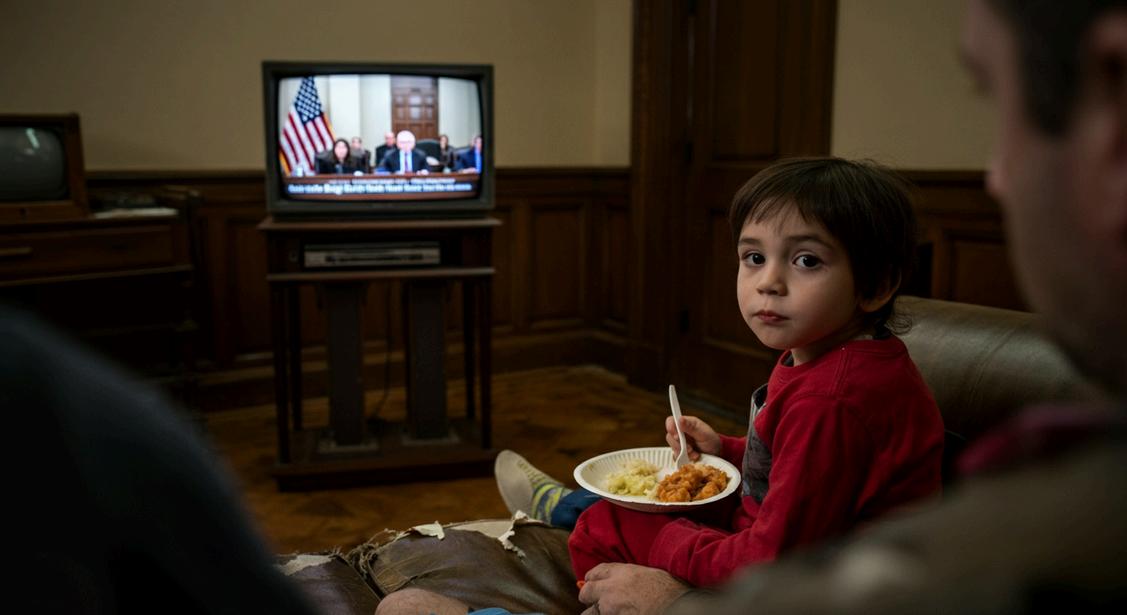

The more we hear about President Donald Trump’s so-called “big, beautiful bill” his name for the massive budget reconciliation bill that would enshrine into law many of his top priorities the harder it is to escape the conclusion that there’s something deeply wrong with our nation’s spiritual health. This bill, which passed the Republican-controlled House of Representatives on a party-line vote, serves as a thermometer and the reading we’re getting back is telling us that the United States of America is suffering from a dangerous fever
Sojourners has made the case many times that a budget is a moral document. Legislation like Trump’s reconciliation bill is much the same, in that its choices about where the government should spend money and where it should cut spending say a great deal about our nation’s moral values Just as families make spending choices by balancing their needs and wants, our federal budget reflects who and what we value. It has significant consequences for who goes hungry, who has access to medical care, and who can travel safely, not to mention how many bombs there are for drone strikes or how much rebar for border walls Viewed in these moral terms, the “big, beautiful bill” is a big, ugly bill that inverts biblical values
One consistent theme throughout the Bible is God’s concern for those who are marginalized or vulnerable in their society In the Bible, this was often the widow, the orphan, the stranger, and the poor. The Bible is replete with rebukes of those who ignore their needs and the spiritual peril of greed: It teaches that “Whoever oppresses the poor shows contempt for their Maker, but whoever is kind to the needy honors God” (Prov. 14:31) The prophet Isaiah warns: “Woe to those who make unjust laws, to those who issue oppressive decrees, to deprive the poor of their rights and withhold justice from the oppressed of my people, making widows their prey and robbing the fatherless” (10:1, 2). Jesus makes it clear that “no one can serve two masters, for either he will hate the one and love the other, or he will be devoted to the one and despise the other You cannot serve God and money” (Matt. 6:24). Paul goes further, writing that the “the love of money is a root of all kinds of evils” (1 Tim 6:10)
In every generation we must ask: Who are our present-day equivalents of the widow, the orphan, the stranger, and the poor? Who are those we consider to be beyond our circle of concern? As we review this budget and think about our current moment, we should remember people living in the quicksand of poverty; migrants seeking shelter from persecution, violence, and economic crisis; children and
families facing hunger and food insecurity; and people without a home
If we take seriously the Bible’s call to consider the economic welfare of these and others who are vulnerable, we must ask whether their needs are being prioritized in our federal budget. After all, the government’s spending decisions are made with our money and are nothing less than a reflection of our collective values as a society. That means we’re on the hook for what our government does and does not do These decisions are being made in our name, generally as Americans and particularly as Christians.
coverage and become uninsured by 2034 The bill would also impose more stringent and harmful work requirements on Medicaid and SNAP beneficiaries, despite the fact that most current recipients who can work already have jobs and ample evidence showing that more work requirements only push people off these programs
One consistent theme throughout the Bible is God’s concern for those who are marginalized or vulnerable in society.
In the past several weeks, Republican lawmakers have fleshed out the broad framework of the reconciliation bill with more specific numbers and policies. Some of the most alarming details include around $260 billion in cuts to SNAP (formerly called food stamps), at least $800 billion in cuts to Medicaid and affordable healthcare, and stripping away the Child Tax Credit from many immigrant fami health care pro mean roughly 1

As we take in these numbers, look beyond the statistics and think instead of the people with real and often dire needs. Imagine how cuts to the programs they depend on will impact their lives Sharon Parrot, president of the Center for Budget and Policy Priorities, a nonpartisan organization that seeks to advance economic justice, noted that the bill “will drive up hunger and deepen poverty, including among children, and take access to life-saving health care away from millions of people,” imposing a particular burden on low-income and immigrant families
As devastating as these cuts would be to some of society’s most vulnerable people, they are dwarfed by tax cuts disproportionately benefiting the richest Americans, cuts that would blow an even larger hole in our already massive budget deficit. According to the independent and nonpartisan organization Committee for a Responsible Federal Budget, the bill as currently written would increase the national debt by at least $3 3 trillion over the next decade and the true number could easily rise to $4 8 trillion by 2038. All told, the reconciliation bill includes $1.1 trillion in tax cuts for the wealthiest 1 percent of households
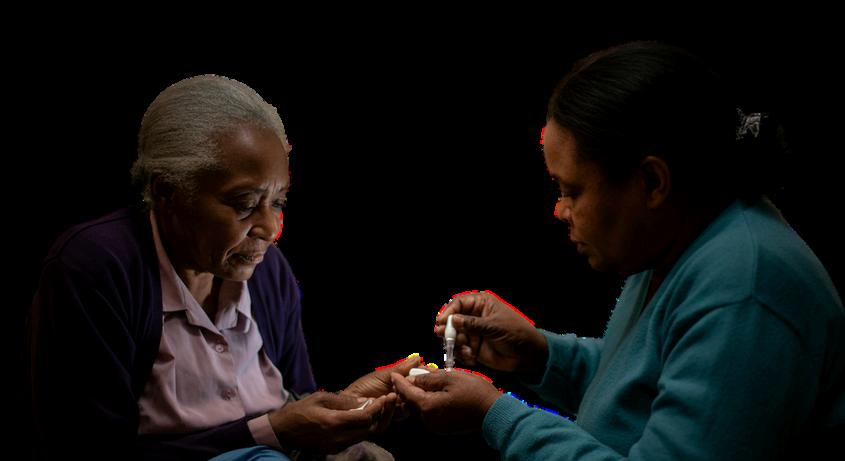

Skyrocketing our national deficit makes a mockery of fiscal responsibility, something many Republicans in Congress have championed; instead, the new bill gives wealthy individuals and corporations tax breaks Coupled with DOGEcuts to the IRS, which weaken the agency’s ability to collect revenue and prevent tax evasion, these measures grow not shrink our national deficit To highlight just how regressive this package has become, Parrot pointed out that the $1 1 trillion in tax cuts that wealthy households will receive would pay for the combined cuts that will be made to Medicaid and SNAP.
These aren’t the only provisions in the bill that reflect a badly misaligned set of moral values and priorities. The bill also includes $46.5 billion to resume construction of Trump’s border wall and billions more to hire thousands of new Border Patrol agents and Immigration and Customs Enforcement officers to implement Trump’s mass-deportation agenda It also would institute a $1,000 fee on migrants seeking asylum for the first time in U.S. history, imposing a tax on people seeking shelter from harm The bill would increase defense spending by roughly $150 billion, which combined with annual defense spending would push this year’s military spending above $1 trillion for the first time ever Last but not least, the bill makes significant cuts to tax credits passed during Joe Biden’s presidency for climate-friendly energy sources such as electric vehicles and wind and solar energy threatening much of the progress on climate change that Biden’s Inflation Reduction Act was meant to achieve
In response to the current reconciliation package, I imagine Isaiah directing some prophetic words to Congress and Trump, perhaps: “Woe to those who make unjust laws.” As much as Trump campaigned on some of these misguided priorities, such as mass
deportations, other parts of this ugly bill were nowhere in his speeches or rallies For instance, Trump didn’t say, “Vote for me, and I promise I’ll cut $800 billion from Medicaid ” But I also think Isaiah and other biblical prophets would have some words of woe for all of us. After all, if the budget troubles us, what are we going to do about it?
Now is the time to pressure Congress to repent from this immoral bill and instead support a budget that reflects our core civic and religious values of economic opportunity and justice, and dignity for all. We can appeal to the conscience of members of Congress and, in many cases, appeal to our shared faith
For those of us with legislators who voted for the bill, it’s up to us to flood representatives’ phone lines and inboxes with our righteous anger at the priorities they’re claiming to pursue on behalf of their constituents; we must demand that they stop rewarding the wealthy at the expense of struggling and vulnerable people. Pray that we will be empowered by the Holy Spirit to advocate relentlessly and fearlessly to defeat this immoral budget and replace it with one that reflects our moral values and priorities.
Adam Russell Taylor is president of Sojourners and author of A More Perfect Union: A New Vision for Building the Beloved Community This article appeared on March 22, 2025 at https://sojo net/articles/opinion/trumps-bigbeautiful-bill-inverts-biblical-values March 22
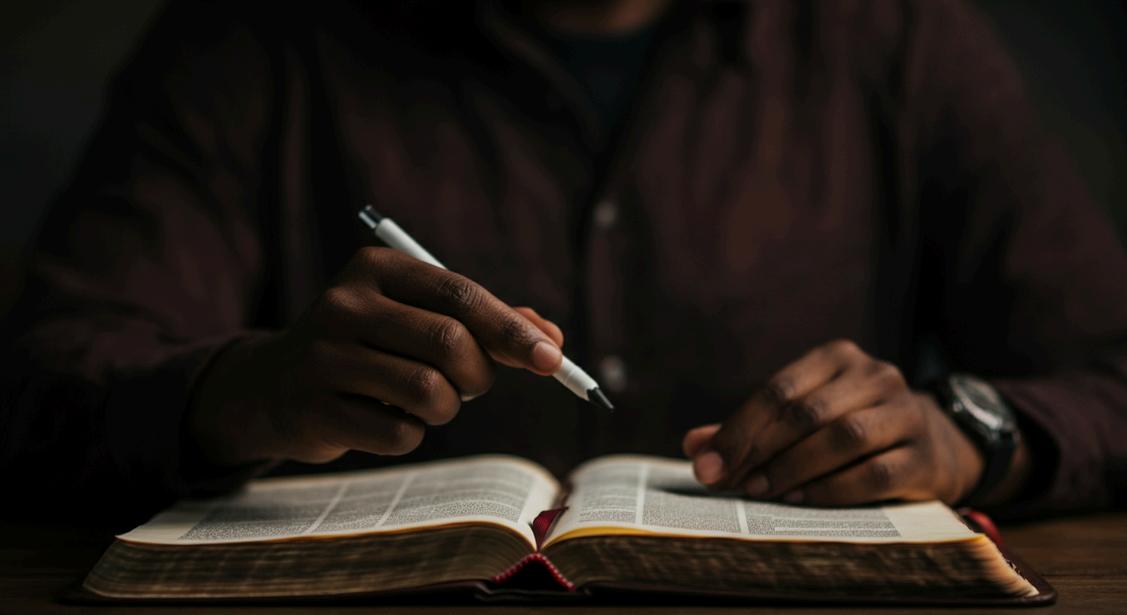

James Baldwin tells us that “ignorance, allied with power, is the most ferocious enemy justice can have.”
One proof of Baldwin’s theory is that many Americans believe that the Bible is skeptical of social justice, even outright hostile to it We see this in how many Americans criticize poor people with lines such as “God helps those who helps themselves” a quote that does not appear anywhere in the Bible. When pressed for a favorite verse, President Donald Trump offered up “an eye for an eye” a sentiment Jesus condemned
Some with low opinions of social justice advocacy try to bend the Bible to agree to their criticisms But while many parts of the Bible leave room for healthy debate and nuance, it is very clear about justice.
In fact, justice is one of the Bible’s major themes. Both the Old and New Testament spend lots of time talking about the importance of treating the poor with dignity, welcoming immigrants with generosity, and paying workers a living wage. These stances may be seen as divisive or partisan in our politicized era, but the Bible calls it righteousness.
Countless verses, stories, and parables in the Bible stress the importance of justice Here are 20 Bible verses about social justice to get us started How is God calling us to get involved in the fight for justice?
Isaiah 1:17
“Learn to do good; seek justice. Defend the oppressed. Take up the cause of the fatherless; plead the case of the widow.”
In the Bible, justice is more than having the right opinions It’s something we actively do
Amos 5:24
“But let justice roll down like water and righteousness like an ever-flowing stream.”
In the Bible, justice is not something to be divvied out to people we think deserve it or screened to be as stingy as possible
Micah 6:8
“God has told you, O mortal, what is good, and what does the Lord require of you but to do justice, and to love kindness, and to walk humbly with your God?”
This verse reminds us that justice, humility, and love are not modern inventions they are expectations God has always had for people
Proverbs 31:8, 9
“Speak out for those who cannot speak, for the rights of all the destitute. Speak out; judge righteously; defend the rights of the poor and needy.”
Advocacy is a biblical command. We are called to be a voice for the voiceless.
Zechariah 7:9, 10
“Thus says the Lord of hosts: Render true judgments, show kindness and mercy to one another; do not oppress the widow, the orphan, the alien, or the poor; and do not devise evil in your hearts against one another.”
As far as God is concerned, justice that does not include society’s most vulnerable is not true justice.
Leviticus 19:15
“‘You shall not render an unjust judgment; you shall not be partial to the poor or defer to the great: with justice you shall judge your neighbor.”
God’s justice transcends wealth and status Everyone is treated equally in the kingdom of heaven.
Luke 4:18, 19
“The Spirit of the Lord is upon me, because he has anointed me to bring good news to the poor. He has sent me to proclaim release to the captive and recovery of sight to the blind, to set free those who are oppressed, to proclaim the year of the Lord’s favor.”
This is Jesus’ mission statement: his declaration at the beginning of his public ministry, in which he declares that God sent him to those who are forgotten and marginalized.
Jeremiah 22:3
“Thus says the Lord: Act with justice and righteousness and deliver from the hand of the oppressor anyone who has been robbed. And do no wrong or violence to the alien, the orphan, and the widow, or shed innocent blood in this place.”
God cares deeply about how nations treat immigrants, orphans, and widows.
Isaiah 58:6
“Is not this the fast that I choose: to loose the bonds of injustice, to undo the straps of the yoke, to let the oppressed go free, and to break every yoke?”
Without a commitment to liberation, our religious rituals and practices are hollow.
Psalm 82:3, 4
“Give justice to the weak and the orphan; maintain the right of the lowly and the destitute. Rescue the weak and the needy; deliver them from the hand of the wicked.”
There is more to justice than just being nice to those who are marginalized We are called to actively defend and, when necessary, rescue them from oppression.
Deuteronomy 16:20
“Justice, and only justice, you shall pursue, so that you may live and occupy the land that the Lord your God is giving you.”
Here, God ties justice to survival A society that does not prioritize justice won’t last long
Romans 12:15
“Rejoice with those who rejoice; weep with those who weep.”
Justice begins with empathy Solidarity must be rooted in compassion
James 5:4
“Listen! The wages of the laborers who mowed your fields, which you kept back by fraud, cry out, and the cries of the harvesters have reached the ears of the Lord of hosts.”
God cares about how employers treat their employees Paying workers poorly disobeys God.
Leviticus 23:22
“When you reap the harvest of your land, you shall not reap to the very edges of your field or gather the gleanings of your harvest; you shall leave them for the poor and for the alien: I am the Lord your God.”
There is more to taking care of the poor than just individual responsibility God weaves charity into the national economic plan.
Isaiah 10:1, 2
“Woe to those who make iniquitous decrees, who write oppressive statutes, to turn aside the needy from justice and to rob the poor of my people of their right, to make widows their spoil and to plunder orphans!”
Justice isn’t only an individual issue God condemns unjust legislation and laws that oppress vulnerable communities.
Galatians 3:28
“There is no longer Jew or Greek; there is no longer slave or free; there is no longer male and female, for all of you are one in Christ Jesus.”
God’s vision of community is radical, crossing every conceivable divide and social status
Matthew 25:40
“And the king will answer them, ‘Truly I tell you, just as you did it to one of the least of these brothers and sisters of mine, you did it to me.’”
Jesus personally identifies with those who are oppressed. Taking care of other people isn’t just a nice idea it’s where we meet Jesus on earth.
Proverbs 14:31
“Those who oppress the poor insult their Maker, but those who are kind to the needy honor God.”
How we treat those who are poor is how we treat God. Justice for those in need is an act of worship
Acts 2:44, 45
“All who believed were together and had all things in common; they would sell their possessions and goods and distribute the proceeds to all, as any had need.”
The early church practiced a just sharing of economic resources
Job 29:14-16
“I put on righteousness, and it clothed me; my justice was like a robe and a turban. I was eyes to the blind and feet to the lame. I was a father to the needy, and I championed the cause of the stranger ”
For Job, justice wasn’t extra credit; it was a way of life.
Tyler Huckabee is managing editor of sojo net
This appeared June 2, 2025 at https://sojo net/articles/bible-verses-aboutjustice-everyone-should-know


The right to peaceful protest is one of the cornerstones of a healthy democracy It is a means for individuals to raise a strong, collective voice before policymakers who hold their lives and well-being in the balance.
Whether you are new to protesting or have been doing it for decades, these tips can help you be safe, prepared, and get your message across
Any medications you need
A comfortable bag or backpack to carry everything
A full water bottle (preferably one that you can squeeze if you need to rinse someone’s eyes)
Snacks (include hard candy in case someone is diabetic)
A protest sign
Cough drops in case your throat is sore from speaking or chanting
Shoes you can walk or stand comfortably in
Comfortable clothes
Change of clothes (in case you get wet, tear-gassed, or pepper sprayed)
Rain poncho
Hand sanitizer
Sun protection (note that oil-based products can prolong the effects of tear gas)
Bandanas or face masks
Goggles (to protect from tear gas)
Permanent marker (to write a phone # on your skin in case you are arrested)
Learn about the issue and the organizations calling for the protest beforehand
Have a buddy Stick together and watch out for each other. Exchange information about who should be called if one of you gets arrested
Make sure someone who won’t be at the protest knows where you are and what they should do if you get arrested (e g feed your cat, call your mom, pay your bail?). Know their number by heart or write it on your skin with permanent marker Be sure to let them know when you are home safely.
Bringing a cell phone? What would happen if it is taken by police? Make sure your phone is locked when not in use, and that notifications don’t appear on screen.
Stay hydrated
Focus on the demands of the protest, centering the message of those most impacted by the issue
Look out for others. We are all safer when we take care of each other. Be mindful of the privileges and vulnerabilities of yourself and those around you.
Don’t engage counter-protesters DO use the four D’s of bystander intervention if they are harassing another protester. (Distract, Delegate, Direct, Delay)
Don’t talk to the police DO refer them to the police liaison. Most protests have a designated person to deal with police; politely direct them toward that person Don’t take pictures of people’s faces without permission. DO take pictures of cool signs and police if they are violating people’s rights (if safe).
Don’t police the behavior of others. DO be curious If appropriate, engage with fellow protesters about messaging or behavior choices, and learn instead of judge.
You have the right to freedom of speech and assembly, but that doesn’t mean that law enforcement will respect those rights You can only control yourself, not law enforcement.
The best way to keep yourself and others safe is to not talk with the police
This is true even if you believe you “have nothing to hide.”
If you are stopped by police, ask them if you are being detained If not, politely and slowly leave.
If you or your belongings are being searched, loudly say “I do not consent to this search.” If safe and possible, record audio and/or video. If someone else is being searched, film what is going on and keep the camera trained on law enforcement.
If you are arrested, say only that you are exercising your right to remain silent and that you want a lawyer. Remember that it is illegal to lie to police, but the police can lie to you
If you can, document the name and badge number of any officer you believe is violating you or someone else’s rights Find out if there is a legal support/bail organization or hotline in your area. Write down the phone number, and also on your body
This article is adapted from the website of the American Friends Service Committee It originally appeared September 2, 2020, https://afsc org/newsroom/how-stay-safer-protest
“Not merely a theological theory a practical roadmap for living in faithful solidarity with those around us.”
Dilys Brooks, campus chaplain at Loma Linda University
“Blake continues to sprint in his lifetime marathon to call Adventists to embrace fully the radical way of Jesus.”
Carmen Lau, Adventist Forum Board Chair
“This is THE book for our time, to make tangible how our faith becomes lifegiving in the real world.”
Karah Thompson, Co-Executive Director of Adventist Peace Fellowship
“This book is a movement toward restoring the world God envisions.”
Moe Stiles, pastor/chaplain, Crosswalk Melbourne
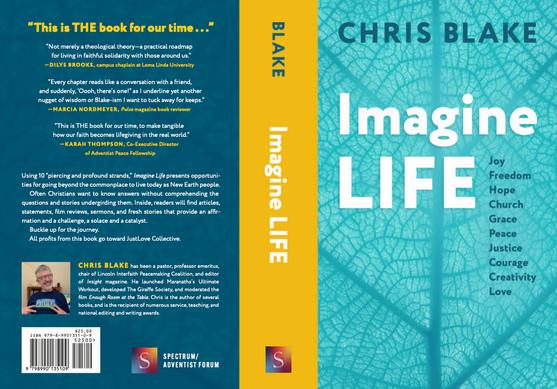

“Chris Blake not only walks the talk, he writes about it in sui generis style.”
Alexander Carpenter, Executive Director and Editor-in-Chief, SPECTRUM

Using ten “piercing and profound strands,” Imagine Life presents openings for going beyond the commonplace to live today as New Earth people

Buckle up for the journey.
All profits from this book go toward JustLove Collective.


A House on Fire: This Adventist Peace Fellowship podcast series is based on the excellent book on race and racism
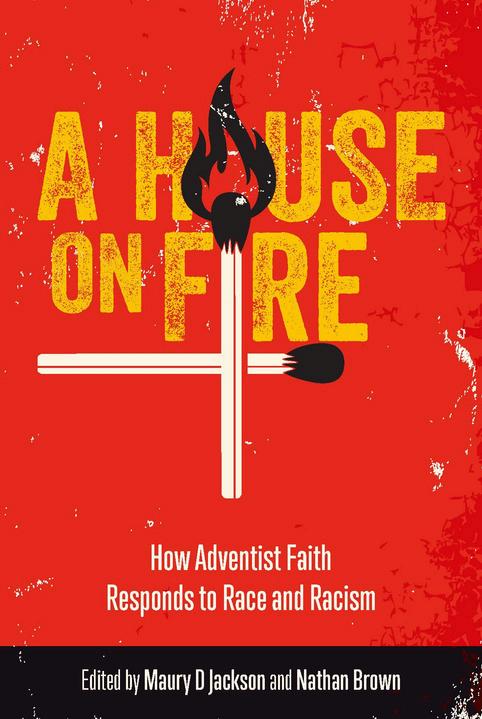
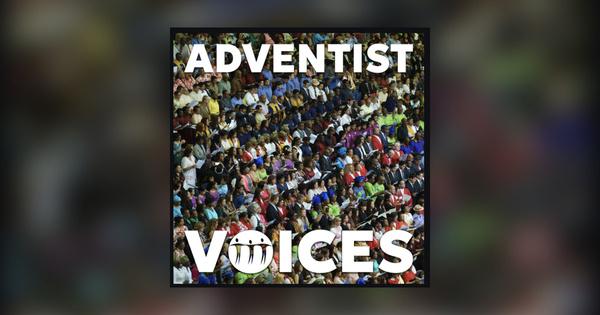
Adventist Voices: Weekly podcast and companion to Spectrum designed to fost community through conversation
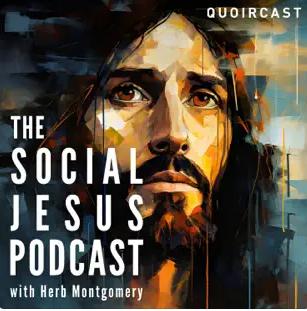
The Social Jesus Podcast talks about the intersection of Jesus, faith, and social justice today

Red Letter Christian Podcast: Christian commentary on the way of Jesus in the world today

Adventist Pilgrimage: A lively monthly podcast focusing on the academic side of Adventist history

Just Liberty: A fresh, balanced take on religious liberty where justice and liberty meet

Pulse is the monthly digital magazine of JustLove Collective
This month’s issue is edited by Stephen Chavez and sponsored by Linda and Larry Smith (Thank you )
Designed by Jeffers
Media
Unless indicated otherwise all Bible references are from the New Revised Standard Version.

Is a writer and editor, retired after a career in pastoral ministry and as an assistant editor of Adventist Review
Is a circulation/reference associate at Union Adventist University's library in Lincoln, Nebraska She is happily married to Jeremy Their two children are encouraged to read banned books
Is professor emeritus at Union Adventist University where he taught English and communication courses, including Conflict and Peacemaking along with Critiquing Film He has also served as editor of Insight magazine, author of many books and articles, and pastor of two small churches.


Discover JustLove Notes a twice-monthly Substack offering illuminating the vibrant intersection of faith, justice, and love. Each issue features curated book recommendations, evocative music, and thought-provoking articles designed to inspire your spirit and empower meaningful change Join us on this journey of discovery and transformation.
Join us for a quarterly, live book circle hosted by the JustLove Collective, to explore transformative ideas Our inaugural session read Troubling the Water by Ben McBride, where we unpacked themes of justice, faith, and renewal Our next session explored Native: Identity, Belonging, and Rediscovering God by Kaitlin B, Curtice, who is both a citizen of the Potawatomi Nation and a Christian Each session invites us to reimagine faith as a force for social transformation.

We are particularly grateful for every contribution to JustLove Collective Donations are tax-deductible Though we are a global movement of volunteers, we do need to pay for expenses related to this magazine and to the Summit. For more information, please see our website at justlovecollective.org

Norma and Richard Osborn
Something Else Sabbath
School
Adventist Peace Fellowship
Rebekah Wang Cheng and Charles Scriven
Anonymous
Yolanda and Chris Blake
Jill and Greg Hoenes
Julie and Ty McSorley
Elizabeth Rodacker & Ed Borgens
SDA Kinship International
Adela and Arpad Soo
Gillian and Lawrence Geraty
Alta Jean & Richard Paul
Karah & Tre Thompson
Linda & Larry Smith
Marit & Steve Case
Jackie and Brian Starr
Harry Banks
Eileen and Dave Gemmel Heart, Soul & Mind Discipleship Class


AdventInnovate is an experimental platform from Adventist Today (AToday.org) dedicated to inspiring and supporting the Adventist community in new approaches to faith. Hosted by Rebecca Barceló, the platform celebrates innovation and entrepreneurship. It champions creative ideas, fresh perspectives, pioneering efforts, and inventive ministries that reimagine faith in today's world.






